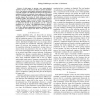Free Online Productivity Tools
i2Speak
i2Symbol
i2OCR
iTex2Img
iWeb2Print
iWeb2Shot
i2Type
iPdf2Split
iPdf2Merge
i2Bopomofo
i2Arabic
i2Style
i2Image
i2PDF
iLatex2Rtf
Sci2ools
CEC
2007
IEEE
2007
IEEE
Implicit alternative splicing for genetic algorithms
— In this paper we present a new nature-inspired variation operator for binary encodings in genetic algorithms (GAs). Our method, called implicit alternative splicing (iAS), is repeatedly applied to the individual encodings in the algorithm’s population and inverts randomly chosen segments of decreasing size in a systematic fashion. Its goal is to determine the largest possible segment the inversion of which yields no loss in the encoding’s quality. The application of iAS potentially produces a new encoding of equal or greater quality that is maximum possible Hamming distance from its source. This allows iAS to uphold the diversity of the population even if a minimal population size is chosen. This significantly improves the performance of an otherwise standard GA on a representative set of three different optimisation problems. Empirical results are compared and analysed and future work prospects are considered.
Artificial Intelligence | CEC 2007 | Implicit Alternative Splicing | Minimal Population Size | Nature-inspired Variation Operator |
| Added | 02 Jun 2010 |
| Updated | 02 Jun 2010 |
| Type | Conference |
| Year | 2007 |
| Where | CEC |
| Authors | Philipp Rohlfshagen, John A. Bullinaria |
Comments (0)

